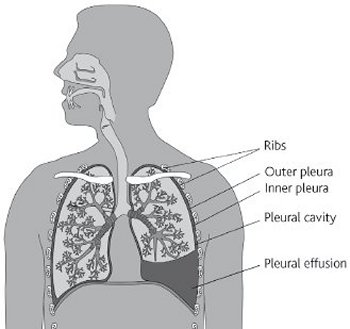pleural effusion

Pleural effusion.
Pleural effusion is a disorder of the pleura, the large, thin sheet of tissue that wraps around the outside of the lungs and lines the inside of the chest cavity. Pleural effusion, which can occur in some cases of pleurisy, is a buildup of excess fluid in the pleural cavity. This buildup of fluid usually forces the two layers of the pleura apart so they don't rub against each other during breathing. This can relieve the pain of pleurisy.
However, a large amount of extra fluid can push the pleura against the lung until the lung, or a part of it, collapses. This can make it hard to breathe.
In some cases of pleural effusion, the extra fluid gets infected and turns into an abscess. This is called an empyema.
Pleural effusion can develop even in a person who doesn't have pleurisy. For example, pneumonia, heart failure, cancer, or a pulmonary embolism can lead to a pleural effusion.
Causes
The most common cause of pleural effusion, or fluid in the pleural space, is congestive heart failure. Lung cancer, pneumonia, tuberculosis, and other lung infections also can cause swelling of the pleura and lead to a pleural effusion. Asbestosis, sarcoidosis, and reactions to some medicines also can lead to pleural swelling and pleural effusion.
Signs and symptoms
Pleural effusion often has no symptoms. However, the build-up of fluid on the lung makes it difficult for the lung to expand fully so that in some cases part or all of the lung will collapse. This can cause increasing breathlessness, not only during exertion, but even at rest. There may also be some chest pain and a cough.
Diagnosis
For methods of diagnosis, go here.
Treatment
For methods of treatment, go here.


